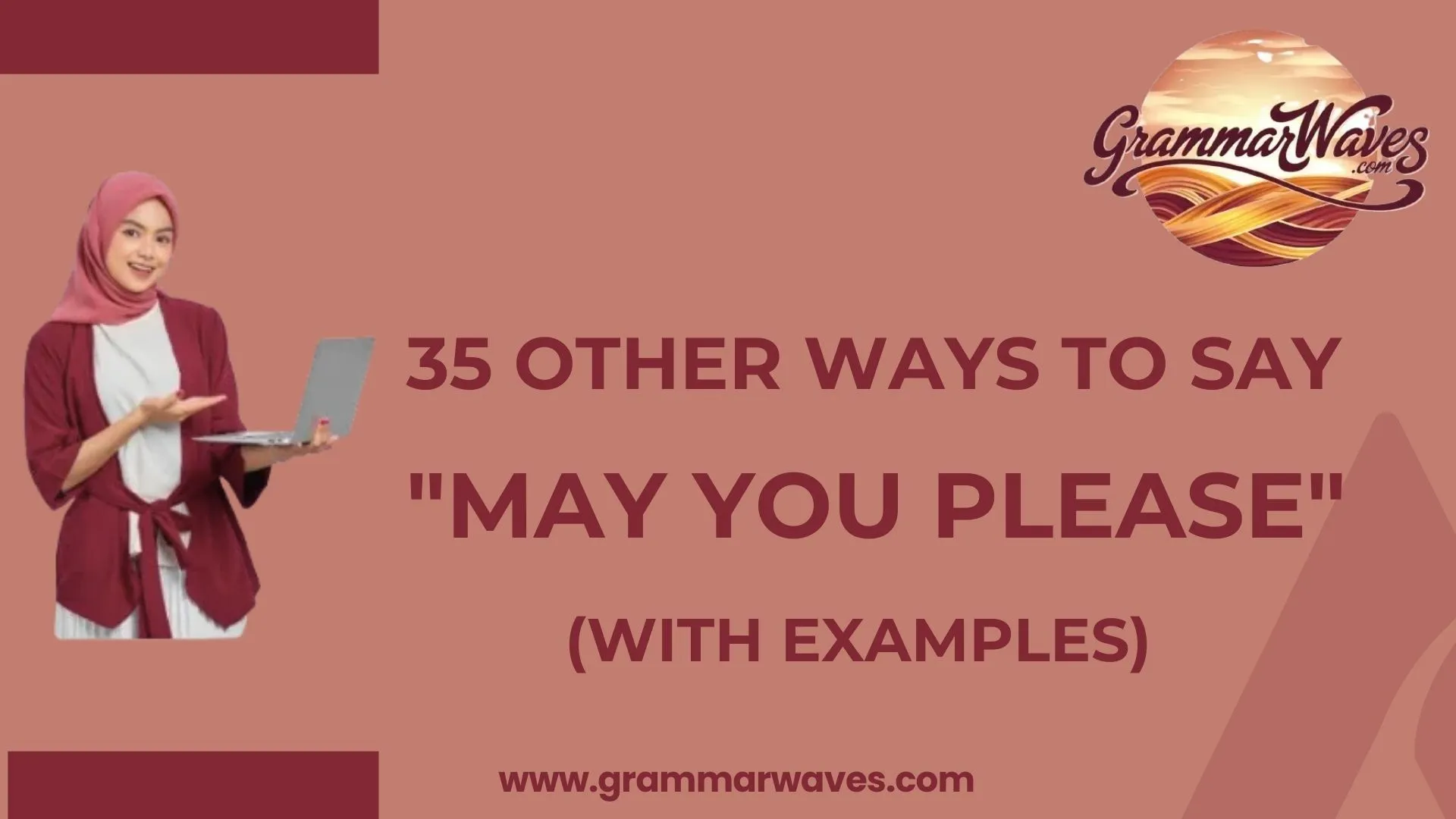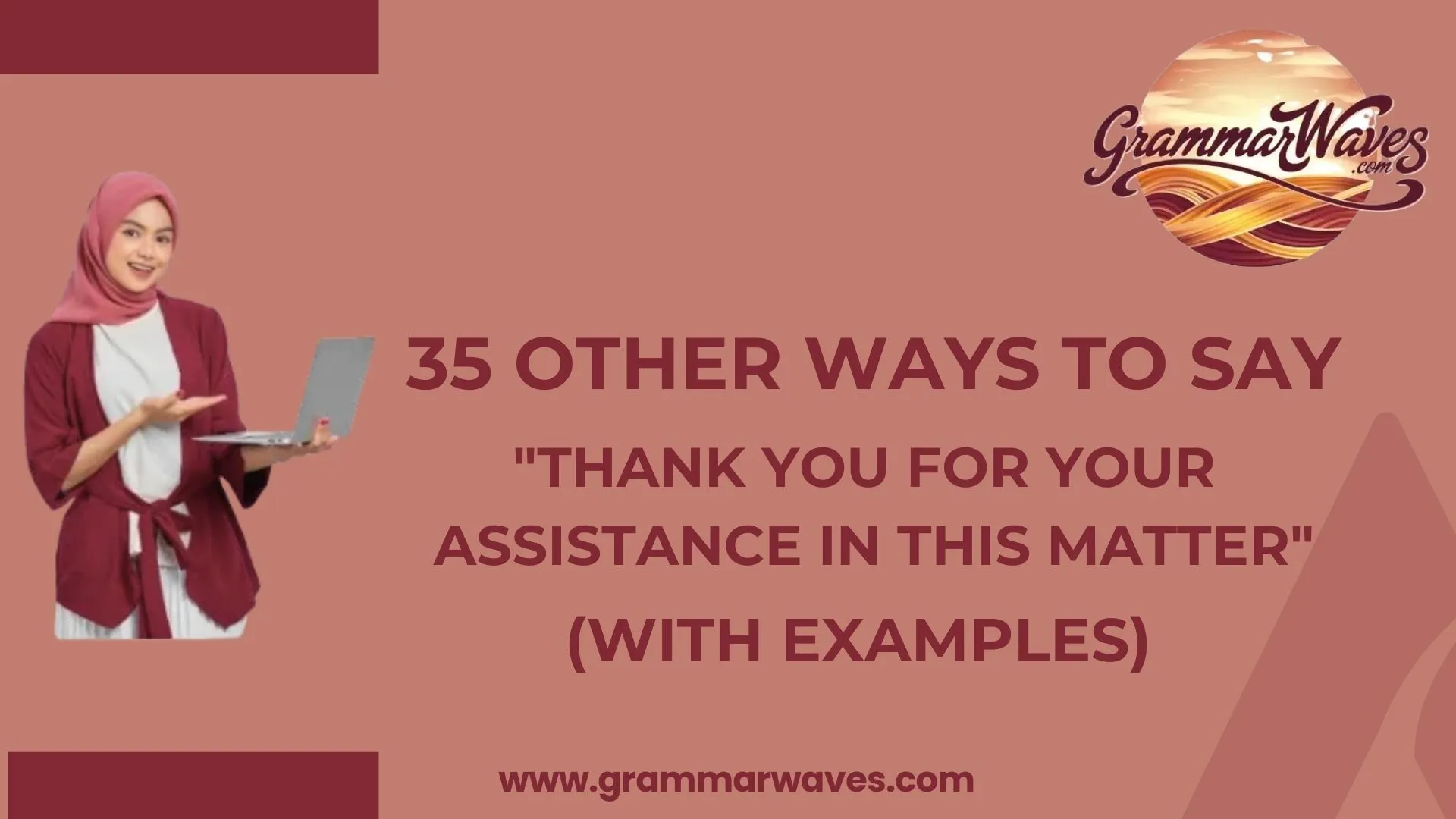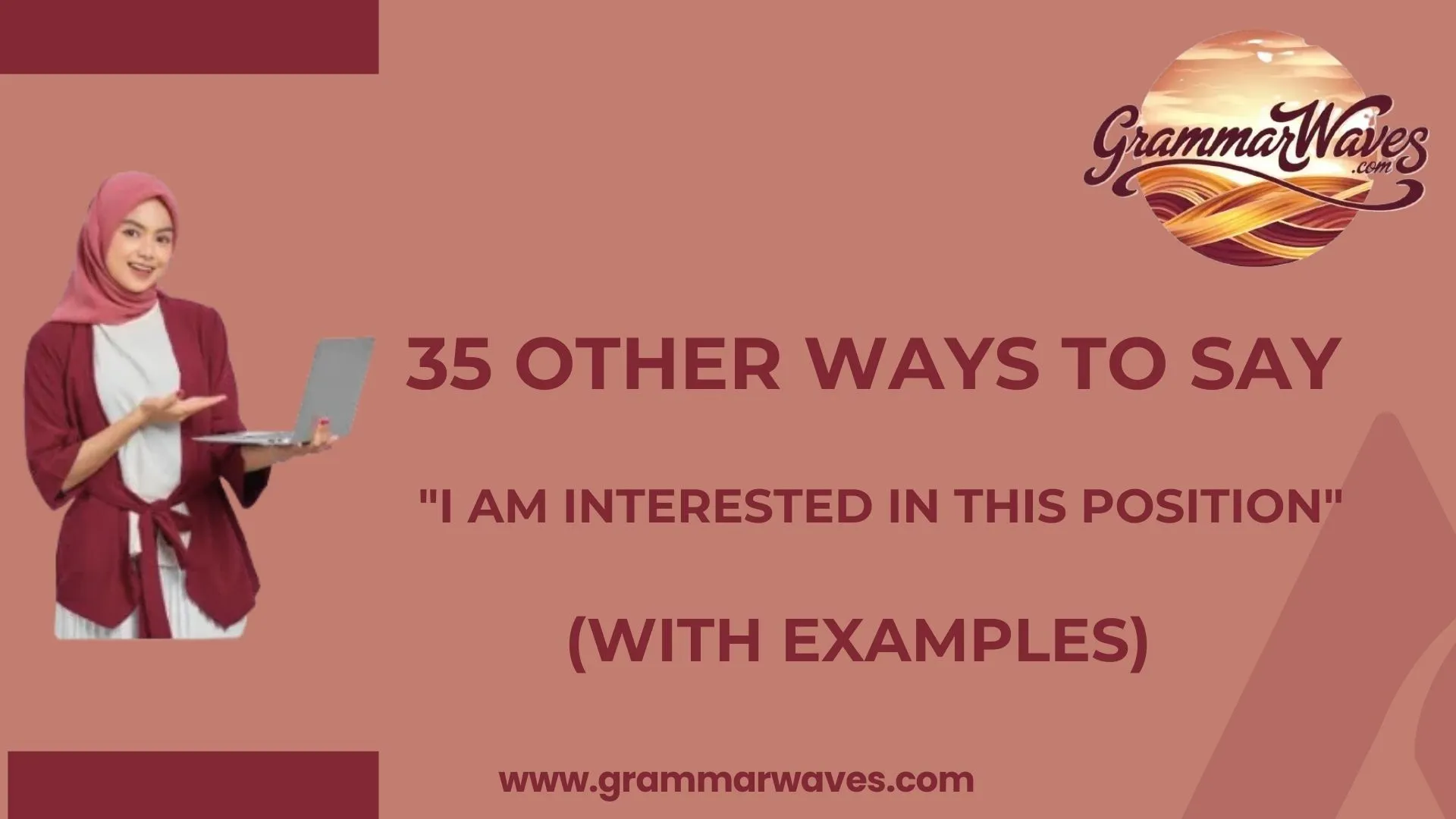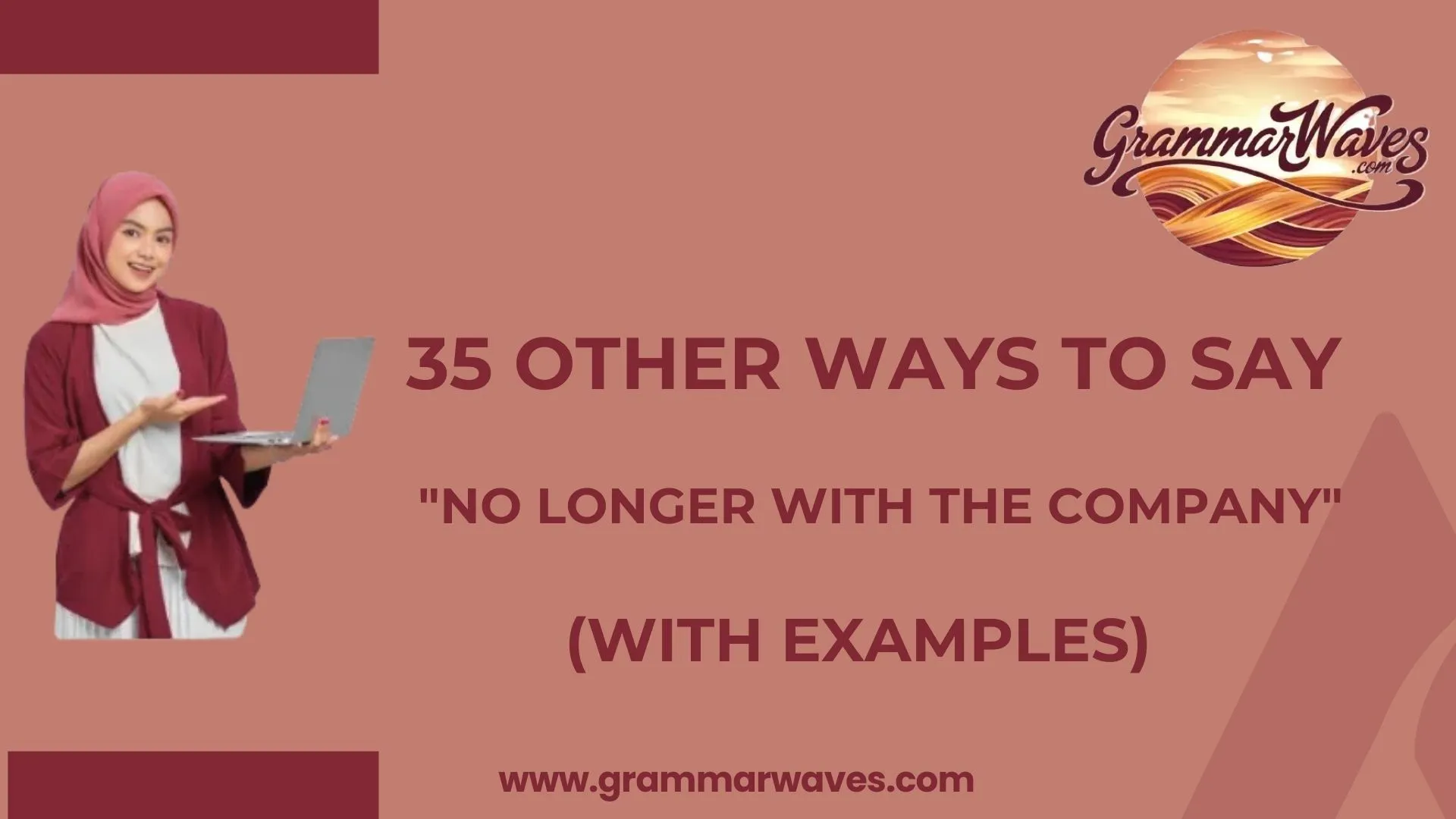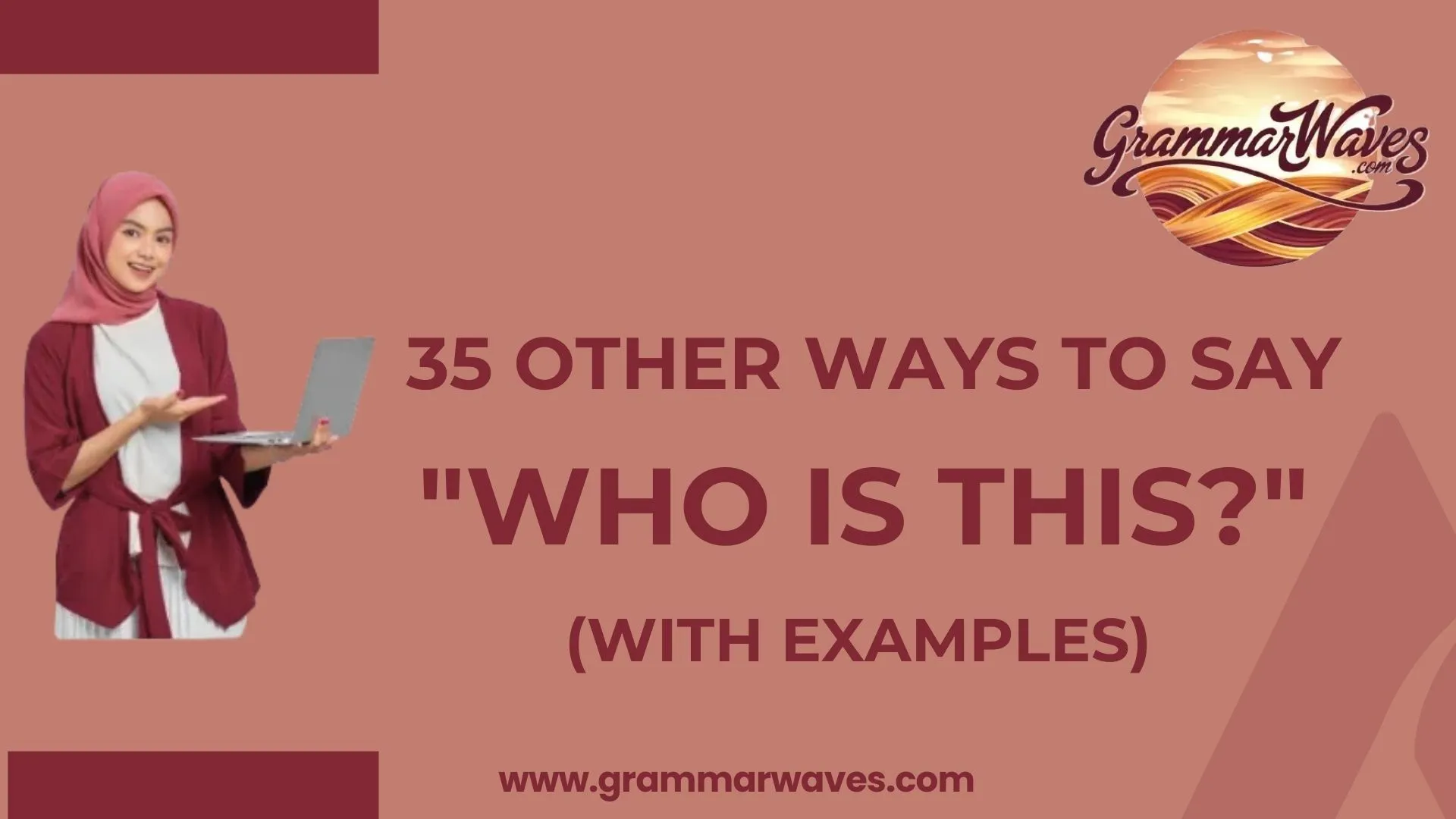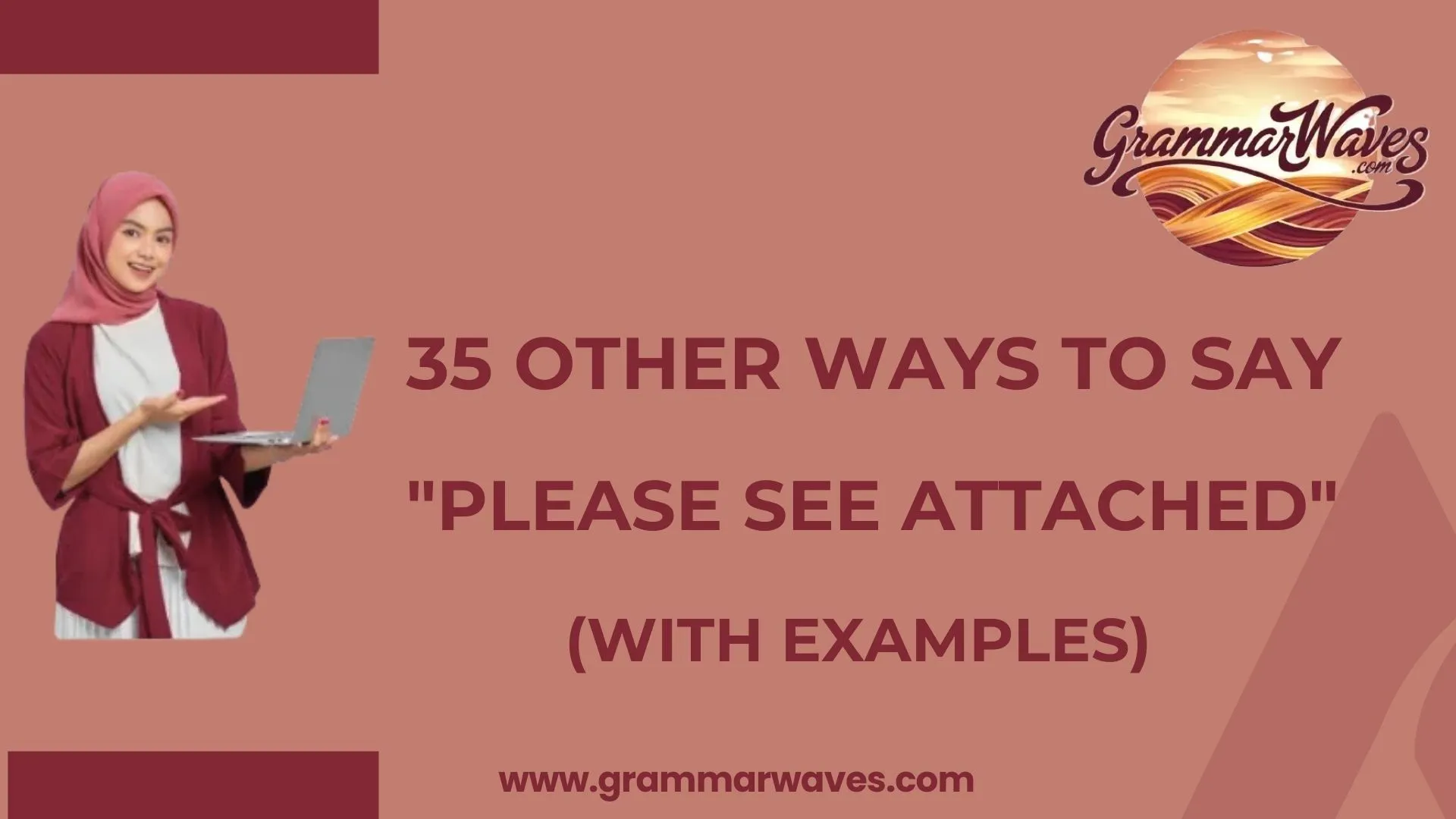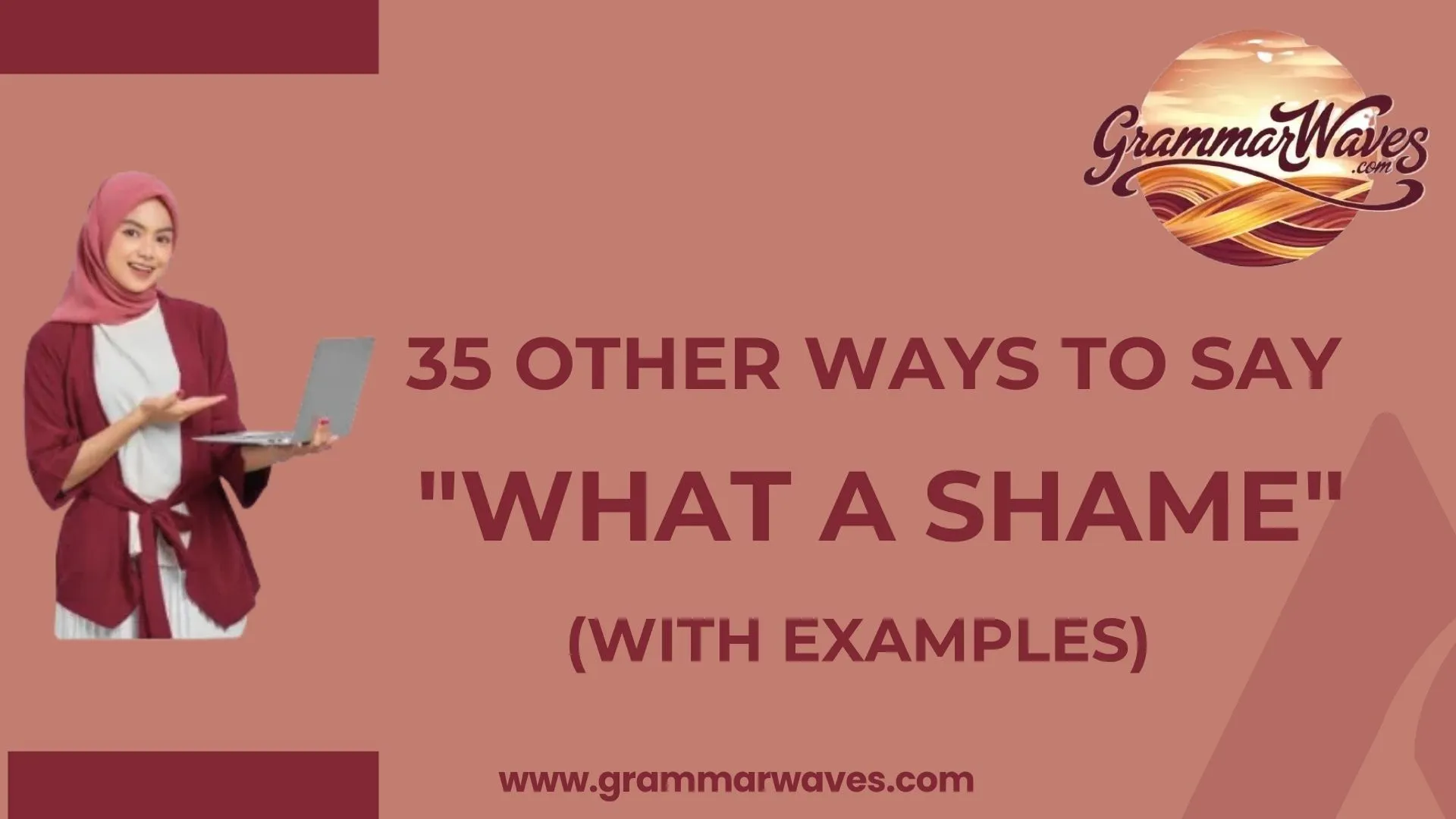These 35 Other Ways to say “May You Please” can make your language more engaging while keeping it polite, especially in formal and professional communication. In my experience working with a team of 35, I noticed colleagues responded better when requests carried warmth and friendliness instead of the same repetitive phrase. This small shift shows genuine care and consideration, elevating everyday interactions while still sounding professional.
Choosing the right vocabulary in the right context shows respect, politeness, and kindness without losing professionalism. In casual chats, softer wording often creates a friendly tone, while in office or formal situations, a direct but still polite choice works better. Having these alternatives ready makes communication feel more natural and shows attentiveness to people’s needs.
What Does “May You Please” Mean?
“May You Please” is a polite phrase often used when making a request. It’s a way of asking for something while showing respect for the other person’s willingness to fulfill the request. It’s similar to saying “Could you please” or “Would you mind,” with an emphasis on politeness and courtesy.
When to Use “May You Please”
“May You Please” is typically used in formal or polite requests. It’s appropriate when you want to ensure that your tone is respectful, especially in professional settings or when addressing someone you don’t know well. However, it can sometimes feel too stiff in casual conversations.
Is It Professional/Polite to Say “May You Please”?
Yes, “May You Please” is a polite and professional way to make a request. However, depending on the context, it might sound a little old-fashioned or overly formal. In casual settings, more modern phrases like “Could you please” or “Would you mind” might be better suited.
Pros or Cons
Pros:
- Very polite and respectful.
- Ideal for formal situations or when speaking to someone in authority.
Cons:
- It may sound overly formal in casual settings.
- It could come off as stiff or unnatural in less formal conversations.
May You Please Synonyms:
- Could You Please
- Would You Please
- Can You Please
- Would You Mind
- Kindly
- If You Would Be So Kind
- Would You Be So Kind
- I Would Appreciate It If
- Could You Kindly
- If It’s Not Too Much Trouble
- Might You Please
- Would It Be Possible
- Could I Ask You to
- I Was Wondering If You Could
- I Would Be Grateful If
- I’d Be Thankful If
- Could You Be So Kind
- Would It Be Too Much to Ask
- If You Could Be So Kind
- Would You Be Willing to
- May I Ask You to
- Would You Consider
- I Was Hoping You Could
- Would You Mind If I
- Do You Mind If I
- It Would Be Helpful If
- Would You Help Me By
- I Was Hoping You Would
- If You Could Please
- If You Would Be Able To
- Would It Be Possible to
- I Would Be Happy if
- Would You Be Open to
- If It’s Not Too Much to Ask
- I’d Be So Grateful If
Could You Please
Meaning:
A polite and common way to ask for something.
Explanation:
This is a more casual alternative that works in both formal and informal settings.
Example:
“Could you please send me the report by tomorrow?”
Best Use:
Office settings, general requests, and emails.
Worst Use:
Very formal or ceremonial situations.
Tone:
Polite and flexible.
Would You Please
Meaning:
Another polite way to make a request, slightly less formal than “May You Please.”
Explanation:
This phrase conveys politeness and can be used in both business and casual requests.
Example:
“Would you please help me carry these boxes?”
Best Use:
When you want to sound respectful but not too stiff.
Worst Use:
In highly formal situations.
Tone:
Respectful and neutral.
Can You Please
Meaning:
A casual, yet polite way to ask for something.
Explanation:
This phrase is commonly used in everyday speech and works well for more relaxed environments.
Example:
“Can you please pass the salt?”
Best Use:
Casual requests with friends or colleagues.
Worst Use:
When addressing someone in a highly formal setting.
Tone:
Informal, friendly, and approachable.
Would You Mind
Meaning:
A polite request that often includes an offer to inconvenience the other person.
Explanation:
This phrase is great for softer, more indirect requests.
Example:
“Would you mind sending me that file when you get a chance?”
Best Use:
When you want to sound considerate and respectful.
Worst Use:
When you need something urgently.
Tone:
Gentle, considerate, and indirect.
Kindly
Meaning:
A polite and formal way to request something, typically used in written communication.
Explanation:
“Kindly” can make requests sound both formal and polite without seeming too forceful.
Example:
“Kindly submit the report by 5 PM today.”
Best Use:
Formal emails or letters, customer service communication.
Worst Use:
In casual or familiar conversations.
Tone:
Formal, polite, and courteous.
If You Would Be So Kind
Meaning:
A very polite, somewhat formal request.
Explanation:
This phrase adds an extra level of courtesy and is great when you want to be exceptionally respectful.
Example:
“If you would be so kind, could you assist me with this task?”
Best Use:
In very formal business or professional settings.
Worst Use:
In casual or lighthearted conversations.
Tone:
Formal, respectful, and courteous.
Would You Be So Kind
Meaning:
A variation of the previous phrase, used to make a request sound even more polite.
Explanation:
It’s another courteous and respectful way of asking for help or a favor.
Example:
“Would you be so kind as to answer the following questions?”
Best Use:
When addressing someone of higher status or when making an especially polite request.
Worst Use:
Informal situations.
Tone:
Very formal and respectful.
I Would Appreciate It If
Meaning:
A polite way to request something while expressing gratitude in advance.
Explanation:
This alternative emphasizes your appreciation, making your request sound thoughtful.
Example:
“I would appreciate it if you could send me the details by tomorrow.”
Best Use:
Emails, customer service, or requests that require a polite tone.
Worst Use:
When you need something immediately or in an urgent context.
Tone:
Grateful, formal, and polite.
Could You Kindly
Meaning:
A softer, slightly formal way of making a request.
Explanation:
This phrasing combines “could you” with “kindly” to make the request sound very respectful.
Example:
“Could you kindly help me with this?”
Best Use:
When you want to remain polite without sounding too stiff.
Worst Use:
Casual or informal settings.
Tone:
Respectful and polite.
If It’s Not Too Much Trouble
Meaning:
A polite way of asking for something, while acknowledging that it might be an inconvenience.
Explanation:
This phrase is often used to soften the request and show concern for the other person’s time.
Example:
“If it’s not too much trouble, could you please check the details?”
Best Use:
When making a request that might take effort or time.
Worst Use:
When the request is urgent.
Tone:
Thoughtful, considerate, and gentle.
Might You Please
Meaning:
A very polite and somewhat old-fashioned alternative to “May You Please.”
Explanation:
This phrase is formal and sounds like a request for permission.
Example:
“Might you please explain how this process works?”
Best Use:
In very formal contexts, like official meetings or written requests.
Worst Use:
In casual settings or everyday conversations.
Tone:
Very formal and polite.
Would It Be Possible
Meaning:
A polite, indirect way to ask for something.
Explanation:
It softens the request and conveys that you understand the other person might not be able to fulfill it.
Example:
“Would it be possible for you to send the report by the end of the day?”
Best Use:
When making a request that requires flexibility or understanding.
Worst Use:
When the request is straightforward.
Tone:
Formal and considerate.
Could I Ask You to
Meaning:
A formal, polite way to request assistance.
Explanation:
This phrase is great when making a direct request, but sounds courteous.
Example:
“Could I ask you to review the document before the meeting?”
Best Use:
Professional emails, meetings, or formal situations.
Worst Use:
Casual conversations.
Tone:
Professional and polite.
I Was Wondering If You Could
Meaning:
A softer, more conversational way to ask for something.
Explanation:
This phrase implies that you’re open to the other person’s decision, making it less forceful.
Example:
“I was wondering if you could help me with this task.”
Best Use:
Informal requests or when trying to sound polite in everyday conversations.
Worst Use:
Formal requests.
Tone:
Casual, friendly, and approachable.
I Would Be Grateful If
Meaning:
A polite, slightly formal way of asking for something while expressing gratitude.
Explanation:
It emphasizes appreciation in advance, making it sound respectful and sincere.
Example:
“I would be grateful if you could attend the meeting tomorrow.”
Best Use:
Formal communication, professional settings, or situations require courtesy.
Worst Use:
Casual settings where simplicity is preferred.
Tone:
Grateful and formal.
I’d Be Thankful If
Meaning:
A polite and appreciative way to make a request.
Explanation:
This phrase expresses gratitude in advance, which can make your request sound more considerate and respectful.
Example:
“I’d be thankful if you could send over the updated contract by the end of the day.”
Best Use:
Requests where showing appreciation is important, especially in professional settings.
Worst Use:
When a request is urgent or demands immediate action.
Tone:
Grateful, formal, and respectful.
Could You Be So Kind
Meaning:
A more formal, polite request that includes the phrase “so kind” to show extra appreciation.
Explanation:
This phrase sounds more gracious and thoughtful when making a polite request.
Example:
“Could you be so kind as to give me your feedback on the presentation?”
Best Use:
Formal situations where you want to express deep politeness and respect.
Worst Use:
Casual conversations with friends or colleagues.
Tone:
Extremely polite and formal.
Would It Be Too Much to Ask
Meaning:
A polite and gentle way of requesting something while acknowledging the potential inconvenience to the other person.
Explanation:
This phrase softens the request, making it sound considerate and humble.
Example:
“Would it be too much to ask if you could send me the documents today?”
Best Use:
When you’re aware that your request might be a bit of an imposition.
Worst Use:
When the request is simple or urgent.
Tone:
Humble, gentle, and considerate.
If You Could Be So Kind
Meaning:
A variation of “Could you be so kind,” adding a bit more courtesy.
Explanation:
It expresses your request while ensuring you show that you’re asking a favor.
Example:
“If you could be so kind as to provide an update, I’d greatly appreciate it.”
Best Use:
When addressing someone formally, like in a business email.
Worst Use:
In informal settings or casual situations.
Tone:
Formal, respectful, and gracious.
Would You Be Willing to
Meaning:
A polite way to ask if the other person would consider fulfilling your request.
Explanation:
This phrase makes your request sound less demanding, as it emphasizes the willingness of the person to help.
Example:
“Would you be willing to help me with the project tomorrow?”
Best Use:
When you’re requesting something that may require some effort or time.
Worst Use:
When you need something urgently.
Tone:
Polite, respectful, and indirect.
May I Ask You to
Meaning:
A formal request, asking permission to ask someone for a favor or task.
Explanation:
This phrase shows deference and politeness, often used in professional or formal settings.
Example:
“May I ask you to review this report before the meeting?”
Best Use:
In professional or official contexts where respect is essential.
Worst Use:
In casual or friendly conversations.
Tone:
Very formal and respectful.
Would You Consider
Meaning:
A polite way to request someone to think about doing something.
Explanation:
This makes the request sound more like a suggestion, allowing the other person to consider the possibility.
Example:
“Would you consider assisting me with this task?”
Best Use:
When you’re unsure if someone can or will help.
Worst Use:
When the request is urgent and cannot be considered.
Tone:
Polite, respectful, and suggestive.
I Was Hoping You Could
Meaning:
A polite way of expressing your hope that someone will help with something.
Explanation:
It implies that you’re not demanding but gently expressing your desire for help.
Example:
“I was hoping you could attend the meeting on my behalf.”
Best Use:
asual and polite requests when you’re hoping for a positive response.
Worst Use:
When your request is a command or highly urgent.
Tone:
Friendly, hopeful, and respectful.
Would You Mind If I
Meaning:
A soft, polite request that gives the other person the opportunity to decline.
Explanation:
This phrase adds an extra layer of politeness by giving the other person an option to say no.
Example:
“Would you mind if I borrowed your notes for the meeting?”
Best Use:
In casual or semi-formal contexts, when you want to give the other person a choice.
Worst Use:
When the request is urgent or requires immediate attention.
Tone:
Polite, respectful, and considerate.
Do You Mind If I
Meaning:
A casual version of “Would you mind if I,” requesting in a more laid-back, approachable way.
Explanation:
It’s an informal, yet polite request, ideal for peers or colleagues in a friendly setting.
Example:
“Do you mind if I take a look at the presentation?”
Best Use:
In informal or friendly settings with colleagues or friends.
Worst Use:
When speaking to someone in a very formal or hierarchical setting.
Tone:
Casual, polite, and considerate.
It Would Be Helpful If
Meaning:
A polite and slightly indirect way to ask for something, implying that it would make a situation easier.
Explanation:
This phrase is often used in business settings, offering a more collaborative tone for requests.
Example:
“It would be helpful if you could send over the reports before our meeting.”
Best Use:
Workplace settings, team requests.
Worst Use:
When you need something urgently.
Tone:
Collaborative, polite, and professional.
Would You Help Me By
Meaning:
A polite way to request someone’s assistance, especially in completing a task.
Explanation:
This phrasing asks for help while making the other person feel like they are assisting rather than just fulfilling a request.
Example:
“Would you help me by reviewing this document?”
Best Use:
Workplace settings, collaborative environments.
Worst Use:
When the task is straightforward or doesn’t require extra help.
Tone:
Polite, collaborative, and respectful.
I Was Hoping You Would
Meaning:
A polite and humble way of asking for something, implying your desire for assistance.
Explanation:
This phrase is often used when you have a clear expectation but want to present your request gently.
Example:
“I was hoping you would help me with this presentation.”
Best Use:
Requests that are somewhat expected, but still need a polite ask.
Worst Use:
When you’re unsure if someone can fulfill your request.
Tone:
Friendly, humble, and respectful.
If You Could Please
Meaning:
A polite way to begin a request, often used in written communication.
Explanation:
This phrasing is soft and respectful, showing that you’re asking for something without demanding it.
Example:
“If you could please provide your feedback by Friday, I’d appreciate it.”
Best Use:
Formal emails, polite requests.
Worst Use:
Casual or informal settings.
Tone:
Respectful, polite, and formal.
If You Would Be Able To
Meaning:
A polite request, often used when asking if someone has the capacity or time to fulfill a task.
Explanation:
This phrase is respectful, indicating that you’re aware of the other person’s potential constraints.
Example:
“If youcouldd be able to send me the draft by tomorrow, that would be great.”
Best Use:
In professional settings, when asking for something that might take time or effort.
Worst Use:
When the task is simple or urgent.
Tone:
Respectful, considerate, and polite.
Would It Be Possible to
Meaning:
A formal way to make a request, often used when you are unsure if the other person can fulfill the request.
Explanation:
This phrasing is polite and indirect, making it easier for the other person to decline if necessary.
Example:
“Would it be possible to reschedule our meeting for next week?”
Best Use:
Professional or formal situations where flexibility is needed.
Worst Use:
Casual conversations with friends or close colleagues.
Tone:
Polite, respectful, and formal.
I Would Be Happy if
Meaning:
A way of asking for something while conveying happiness if the request is fulfilled.
Explanation:
This phrase implies a positive outcome and shows that you would be pleased if the person helps.
Example:
“I would be happy if you could provide me with your feedback by Friday.”
Best Use:
Workplace or professional settings where collaboration is key.
Worst Use:
Casual or informal situations.
Tone:
Polite, enthusiastic, and respectful.
Would You Be Open to
Meaning:
A polite way of asking if someone would be willing to do something, allowing them the choice to accept or decline.
Explanation:
It’s a softer, more open-ended request.
Example:
“Would you be open to reviewing my proposal?”
Best Use:
When you want to give someone flexibility in their decision.
Worst Use:
When the request is non-negotiable.
Tone:
Polite, respectful, and open-minded.
If It’s Not Too Much to Ask
Meaning:
A very polite and considerate way to ask for something, acknowledging the effort it might take.
Explanation:
This phrase softens the request by suggesting that it may require some effort on the part of the person being asked.
Example:
“If it’s not too much to ask, could you please pick up the lunch for the meeting?”
Best Use:
When making a request that might involve inconvenience or effort.
Worst Use:
In situations where time is critical.
Tone:
Considerate, polite, and respectful.
I’d Be So Grateful If
Meaning:
A very polite, respectful way of making a request with an emphasis on gratitude.
Explanation:
This phrase not only asks for help but also emphasizes how thankful you would be for the person’s assistance.
Example:
“I’d be so grateful if you could assist me with this task.”
Best Use:
When you want to express genuine gratitude in a professional or formal setting.
Worst Use:
In casual or informal conversations.
Tone:
Grateful, respectful, and formal.
Conclusion
Asking for something in a polite, thoughtful way is essential for maintaining positive relationships and creating a respectful communication environment. With these 35 alternatives to saying “May You Please“, you have a diverse toolkit for various situations. Whether you’re speaking casually with a friend or making a formal request at work, these phrases will help you sound kind, respectful, and considerate.
FAQs
Why should I use alternatives to “may you please”?
Using alternatives prevents your speech or writing from sounding repetitive. It also helps you adjust tone depending on whether the setting is formal, professional, or casual.
What are some polite substitutes for “may you please”?
Common alternatives include: “Would you mind,” “Could you kindly,” “Would it be possible,” “I’d appreciate if you could,” and “Could you please.”
Are some phrases better for professional emails?
Yes. In business settings, phrases like “Would you be able to” or “Could you kindly” often sound polished and respectful while keeping a professional tone.
Can I use casual alternatives in friendly conversations?
Definitely. In casual chats, softer wordings like “Can you do me a favor” or “Would you help me out” create a warmer, friendlier approach.
Does tone matter more than the phrase itself?
Absolutely. The same phrase can sound either polite or rude depending on how it’s delivered. Being mindful of tone ensures your request is well-received.

Hi, I’m Johnny Peter, the voice behind Grammarwaves.com – a platform dedicated to making English grammar simple, clear, and easy to understand for everyone. With years of experience in language education and a deep passion for writing, I break down confusing grammar rules into everyday English that anyone can grasp.
